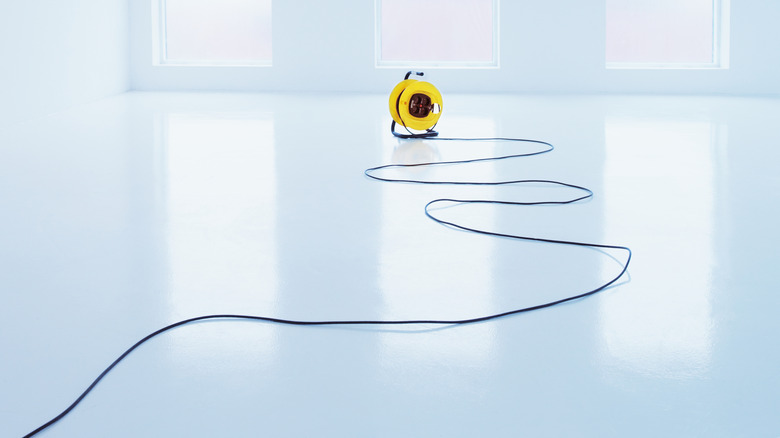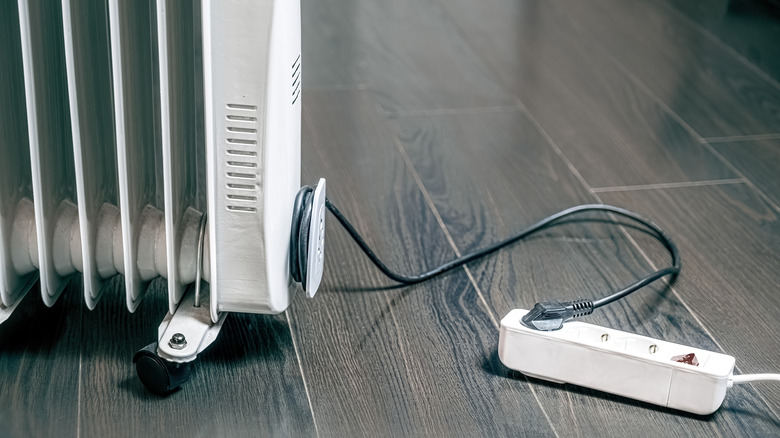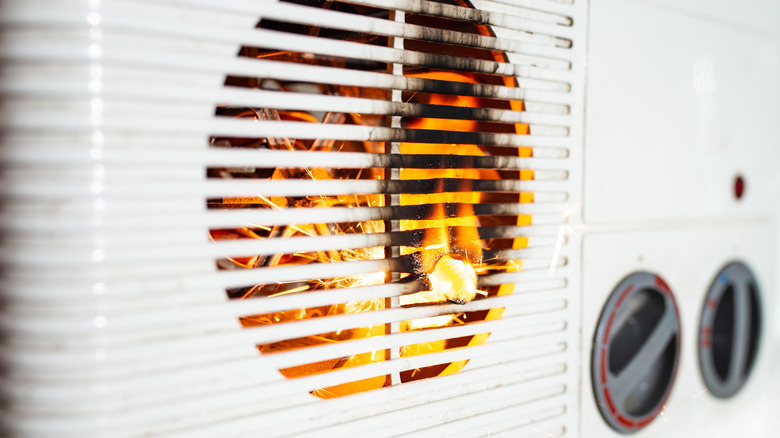The Hazardous Extension Cord Mistake That Can Cause Serious Damage
Extension cords are both a necessity and — and least, when it comes to the way we use them — a terrible idea. We have very precise, some would argue overly guarded, regulations about the electrical wiring in our walls, but once that power gets to the outlet, it's every man for himself. To use them safely, you're expected to have an unrealistic level of expertise.
You know what's actually realistic? That somebody will get cold at night and decide to plug a 1500-watt space heater into a cheap 16-gauge extension cord designed for Christmas lights. Which, to make it very clear, you should never, ever do.
The only thing easier than misusing an extension cord is ignoring the constant parade of vague warnings against misusing them. Without an idea of what the problem actually is, and how serious it is, it doesn't take. That's why Hunker spoke exclusively with Dan Mock, VP of Operations at Mister Sparky Electric, about safe and unsafe uses of electrical extension cords, and he filled us in on the details. He put the problem in clear terms: "You should never plug a space heater into an extension cord as it is considered a serious safety risk and can potentially cause a fire due to the high electrical current a space heater draws, which most extension cords are not designed to handle," Mock said. "Always plug a space heater directly into a wall outlet."
Extension cords aren't meant for appliances like space heaters, and it's not worth the risk
The big problem with extension cords is that people use them for appliances and devices (see: space heaters) that draw more power than they were designed to handle. Electric space heaters are designed to max out 15-amp home electrical circuits and which conveniently announce their hazards by conveniently converting electricity to heat. But the problem can exist for other devices, as well, particularly those with large power needs caused by components compressors and high-powered motors, like refrigerators and sump pumps. When Hunker spoke exclusively with Mister Sparky VP Dan Mock, he explained that the main risk is getting more heat than you bargained for. "They should be plugged directly into a wall outlet, as extension cords and power strips can overheat and pose a fire risk."
Your heater's wattage is only one part of the problem. Preventing cords from dissipating heat, using cords that are too long, and using cords with exposed conductors worsen the dangers. "To safely use extension cords," Mock said, "avoid overloading them with high-wattage devices, running them under rugs or furniture, or daisy-chaining multiple cords together, as these can cause overheating and fire hazards." And all these risks are exacerbated by using extension cords as anything other than a temporary measure. "Damaged or frayed cords should be replaced immediately," he said, "and extension cords should never be used as permanent wiring."
There are a few other bad habits, as well. "Avoid stapling or nailing cords to walls, exposing them to water, or leaving plugs loosely inserted," Mock said, "as these increase the risk of electrical shocks and fires."
Can an extension cord EVER be safely used with a space heater?
So, is it ever possible to plug a space heater into an extension cord, or should we just write off that concept altogether? When Hunker spoke exclusively with Dan Mock of Mister Sparky Electric, he made it pretty clear. "Mister Sparky advises against using extension cords with space heaters due to the risk of overheating and potential fire hazards," he said. "However, if using an extension cord is absolutely necessary, it's crucial to select one that can handle the electrical load of the space heater."
So, how do you know what the right cord is for a particular electrical load? It mostly has to do with the gauge of the wire used, which ranges from 16-gauge (the smallest capacity) to 10-gauge (the largest). According to Mock, "A heavy-duty extension cord with a lower gauge number (e.g., 12 or 14 gauge) is recommended, as these can safely carry the higher current required by space heaters." But remember that you can undermine the gauge by using a cord that is too long, or by connecting multiple extension cords together. Wires lose ampacity — the amount of current they can handle — as their length increases. Mock also reminded us to never use indoor-rated extension cords outside.
What it amounts to is reading labels and using caution and the right type of extension cord. Plug high-powered devices like heaters and refrigerators directly into wall receptacles whenever possible. Only use extension cords temporarily, and only for the sorts of devices and situations they're rated for. And if you are uncertain, move your reading chair closer to an outlet and plug your space heater in there.


